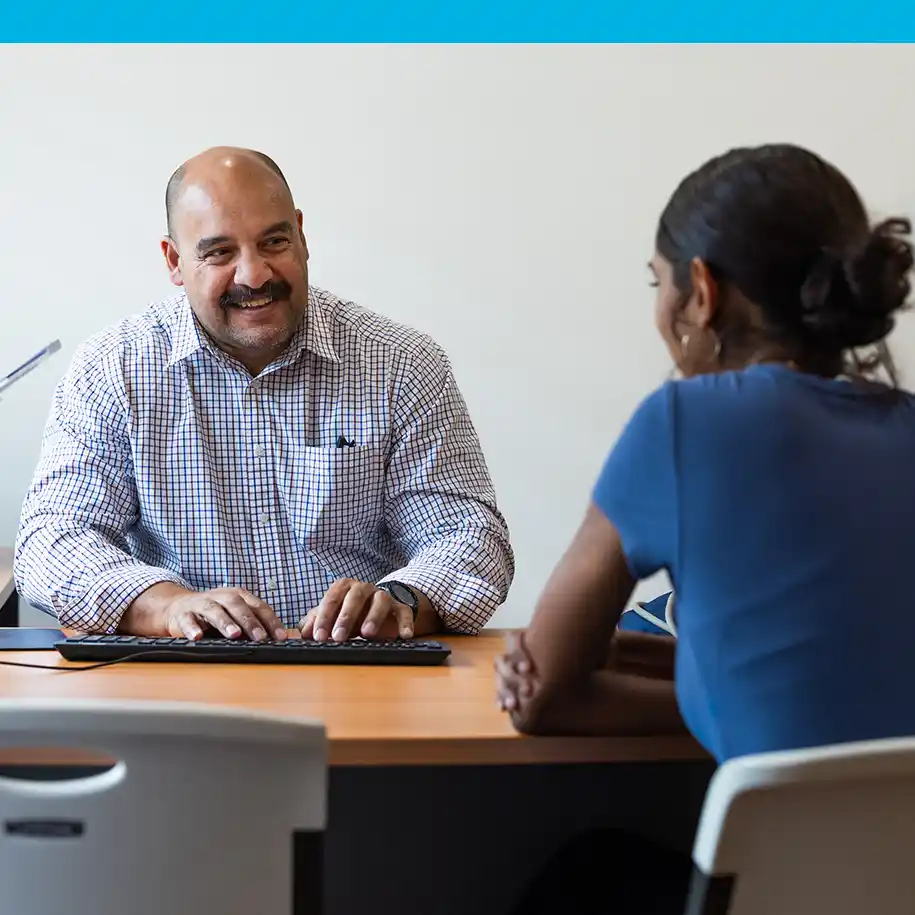
How quality coaching helps learners connect education pathways to career success
Helping learners bridge the gap between education and career
In an age of job dissatisfaction, high turnover and growing income inequality, individuals are looking for meaningful employment that can provide a secure life for themselves and their families. According to the Pew Research Center, only about half of all U.S. workers say they are extremely or very satisfied with their job — and an even smaller number are satisfied with their opportunities for training and skills development. Just 32 percent of full- and part-time employees felt engaged at work in 2022, per Gallup research — with nearly three in four disengaged employees looking for a new job. At the same time, a Strada Education Foundation report, Talent Disrupted, shows that only about half of graduates with a bachelor’s degree secure employment in a college-level job within a year of graduation.
With economic and social mobility as the goal, education is still the most fruitful way to get there — whether that means an associate or bachelor’s degree, professional certificates or specialized job training. But how individuals are guided through their education — in a way that connects their investment in time and money to their career opportunity — makes all the difference.
In Strada Education Foundation’s inaugural State Opportunity Index report, states are given a quantifiable set of indicators that support a stronger connection between education and opportunity, establishing a baseline for how states are doing in five priority areas. Along with Clear Outcomes, Affordability, Work-Based Learning and Employer Alignment, “Quality Coaching” is a crucial measure of success. As an organization with coaching at the heart of everything we do, we pay special attention to this area.
As the report explains, “Quality coaching is a game changer for students. It helps them identify their talents and interests, choose career goals, map education pathways, and navigate challenges along the way.” Coaching is the ultimate bridge between education and career.
So how exactly does quality coaching support the education-to-career pathway? In this blog post, we explore three key questions for institutions to consider as they evaluate their own strengths and opportunities in this area.
1. What can institutions do to ensure that every prospective and current student receives guidance to understand the education-to-employment path that fits their interests, and how can institutions support them while they choose a path and make plans for success?
Personalized, tech-enabled coaching is a highly effective way to provide students with guidance to help them connect and achieve their educational and career goals. Yet students and even institutions may not fully understand what coaching is and how it can help. InsideTrack coaching is a proven solution that provides holistic, tailored support to individuals throughout their education-to-career journey. Using our evidence-based, research-confirmed methodology, our coaches assess and address potential risk factors and opportunities to help individuals develop the knowledge, skills and beliefs they need to advance.
When working with prospective students, coaching helps you tie enrollment strategies directly to career outcomes. Making career readiness an integral part of the education journey is crucial, as learners want to make sure — before they enroll in college — that the education pathway they choose will pay off at the end of their degree or certification program.
Better skills, better jobs: In this video, Dr. Laura Leatherwood, President of Blue Ridge Community College in North Carolina, explains how investing in education to gain better skills and get a better job gives learners the power to lift up their families — a key way to impact generational poverty. A primary success factor in this initiative was assigning a success coach to every single adult learner. And the results have been impressive.
Coaching helps keep everyone rowing together toward a common goal
It's also important to make sure the handoff from “prospective student support” to “current student support” is seamless. Put yourself in the shoes of a prospective student who goes through the process at your college or university to inquire, complete all the necessary steps, and ultimately enroll — then continue on as a student at your institution. Think about all the different touchpoints that entails — admissions, academic advising, career counseling, student support, financial aid, student life — and how baffling that process can be for students.
Now add an effective coach to the mix and think about how differently that could go. Not only will the coach help their students connect the dots between departments, address pain points and create concrete next steps, they will also incorporate career throughout the process — everything from managing priorities, exploring opportunities and evaluating options to confirming that education and career are aligned. Making sure the student has all the information they need and is clear on the pathway that matches their goals helps set them up for success from the get-go.
Assessment questions to help you boost enrollment: Looking for ways to help prospective students enroll and thrive at your school? A seasoned InsideTrack enrollment coach shares detailed assessment questions to help you make your initial outreach count, keep the connection going, and help learners create a focused path forward — with clear goals and crucial next steps — ready to continue their journey from coursework to career.
Providing continuity of care at every step on the education-to-career path
Institutions may also consider training and development opportunities as a way to create or equip in-house student support teams to better serve students — creating in-depth, comprehensive programs that can carry on for the long term.
That’s the idea behind InsideTrack’s coaching development and training, helping institutions build sustainable in-house coaching programs. Coach training can allow institutions to truly reach every student they serve, since it equips their student-facing staff with a proven methodology they can use in all student interactions. What’s more, that specialized and robust training for staff incorporates a holistic methodology that addresses the whole student. Not just academics, but all areas of their life — including their career aspirations.
By evolving student support from transactional to transformational, staff gain the knowledge, expertise and ability to continue to provide students with quality coaching for years to come — ultimately creating a continuity of care that will help more and more learners persist, stay on course and achieve their goals.
In InsideTrack’s latest report, Empowering Teams, Transforming Outcomes, we provide a comprehensive plan of action for colleges and universities to equip their staff with sustainable methods for keeping students on track toward graduation. This actionable guide contains firsthand thoughts and lessons learned from supporting more than 130 partners who have embedded coaching into their student support and guidance, as well as insights from dozens of higher ed leaders across the country — demonstrating how to build capacity and transform student support services. Armed with an in-house coaching program, schools can better connect a student’s education with their planned career.
PBI strengthens teams to bolster education-to-career guidance: In order to embed a holistic, evidence-based coaching methodology into their career and advising services, Peirce College staff received intensive training and certification from InsideTrack. Learn what happened as staff from both departments became fluent in the same student-support language — helping them better understand and address their students’ challenges and motivations along their education-to-career pathways.
2. How can institutions ensure students are receiving the right information at the right time?
Are your student-facing functions on the same page? Learner experience mapping, student focus groups, surveys and other assessment tools are a great way to think about your institution from the student’s perspective. When are learners typically bringing up “career” in their conversations with staff? Do students feel they have support in choosing a degree pathway or certificate program that aligns with their interests and career goals? What touchpoints do students have that can facilitate the education-to-career connection?
Going through the process of answering questions like these lets you discover the challenges and barriers your students face — then learn how to come together across different departments to better the student experience. By fully understanding the processes from the student’s point of view, you can identify areas (and ways) to make improvements.
Getting the staff’s perception is also key. Having answered the question about when learners are bringing up the topic of career, for example, we can then ask, “How equipped are staff members to navigate the questions and requests students have about career pathways?” With both the staff and student perspective in hand, you begin to get a sense of what information is needed, as well as when and how it can be delivered most effectively. While it sounds simple, following through and committing to implementing changes based on the evaluation results can actually be the hardest part. Real change can be difficult. But when it’s in the best interest of helping the student align their educational choices with their career goals, it’s also imperative.
Coaching to start the career conversation at NCTC: Rather than simply training coaches, North Central Texas College (NCTC) committed to holistically changing their support system to fully incorporate InsideTrack's research-proven coaching methodology — a cultural shift that included staff in all departments. Looking to do even more, they began working with high schools to coach students to begin thinking about career paths early, then continued the support through their time at NCTC. They created coaching relationships with area employers too. By using coaching in different ways, they ensure the continuity of care. This, in turn, helps students receive the information they need, when they need it, from the sources that matter — including employers.
Clearly, it’s never too early to talk with students about their career options — the earlier and more frequently, the better. That’s said, it’s important that everyone they talk to at the institution is on the same page, making sure they receive consistent support that will see them through to graduation and beyond.
3. What steps can institutions take to provide every student with support to overcome obstacles they encounter in pursuing their education-to-career path?
Quality coaching is all about helping students overcome obstacles — whatever those obstacles may be. For some it’s financial issues or challenges with belonging. For others it’s anxiety or mental health concerns. And sometimes it’s being away from home, family and a network of support that creates obstacles. That’s where coaching can be a huge help.
If a student has access to a coach — including staff members who have been trained in a holistic coaching methodology — it can help them get past the surface level pain points and really address the root causes of what’s making them stuck or struggle.
What’s great about coaching, done right, is that it doesn’t solve problems for the student — it gives them the confidence and resources they need to solve problems on their own. Coaching supports the development of specific knowledge, skills and beliefs necessary for success in school, career and beyond. Emphasizing noncognitive competencies — such as critical thinking, problem solving, creativity, adaptability, time management, conflict resolution and perseverance — promotes transformative, long-term learning. Not surprisingly, these are the exact same attributes that are most important to employers, again showing the importance and impact coaching has on career.
How one aspiring nurse leveraged coaching to reach his career aspirations: Nursing student Ryan Casim was determined to become a nurse. But studying, assignments and highly stressful clinical rotations — in addition to a full-time job — had him ready to drop out. Instead, he worked with his InsideTrack coach, learning to prioritize, refocus and succeed — first earning an associate’s degree in nursing, then a BSN, graduating summa cum laude while working two jobs!
Making education-to-career success a priority — and a reality
Embedding coaching to help students overcome obstacles, clarify goals and stay motivated to earn their degree or certificate not only makes sense, it’s also proven to work. InsideTrack’s coaching methodology has been recognized as high-impact and high-evidence by the U.S. Department of Education What Works Clearinghouse of Evidence Based Practices.
As a nonprofit, our mission is to fuel social mobility and close equity gaps by empowering and advancing all learners. We use the power of quality coaching to help students achieve their educational and career goals. And through coaching, we’re able to help learners at every stage of their educational and career journeys tap into their reasons for being in school, overcome obstacles, map out a clear path forward and thrive. Quality coaching and guidance is critical in helping students gain an education that will help them achieve their career aspirations.
Discover how coaching for career readiness helps learners, employees and those looking to connect to the workforce prepare for their careers.
Coaching solutions proven to advance all learners
Whether you’re looking to help students persist through completion or to improve career outcomes for job seekers and employees, our holistic coaching solutions can help you achieve meaningful outcomes.



